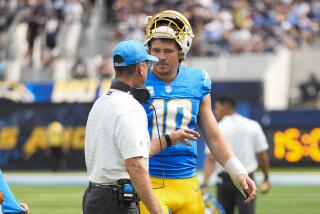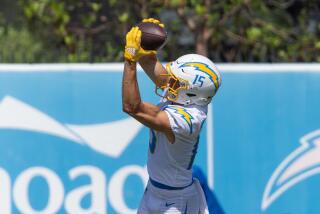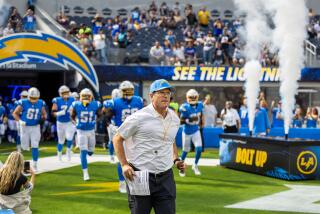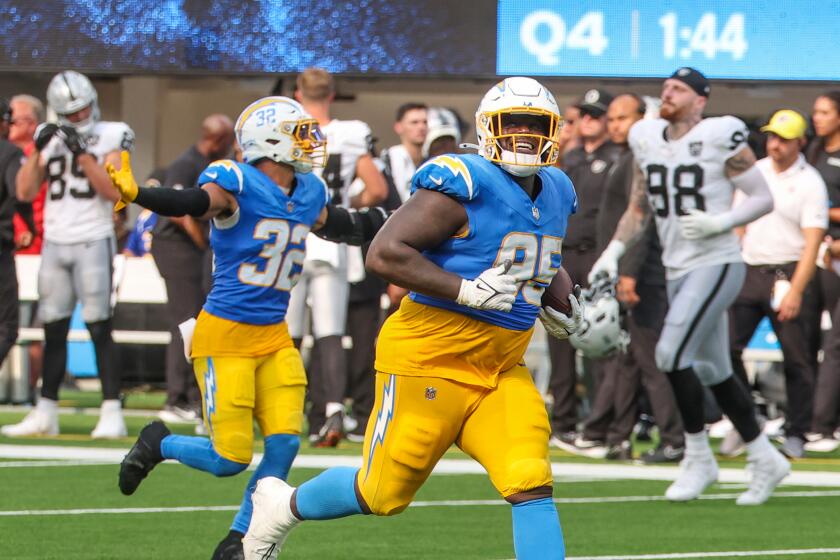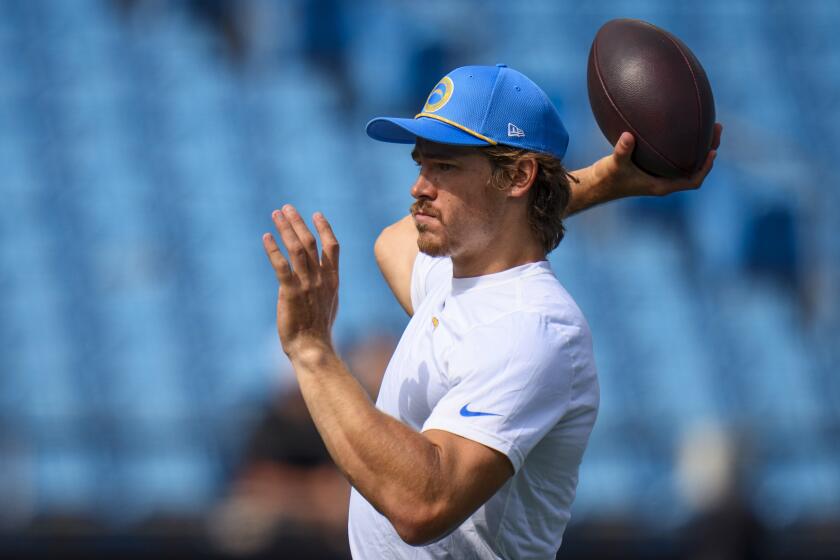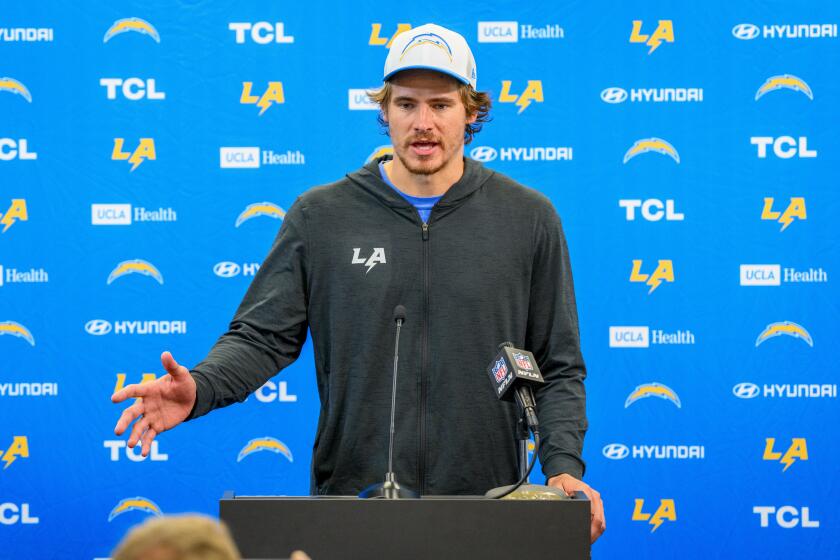Chargers’ left tackle Okung clearing a path for others on and off the football field
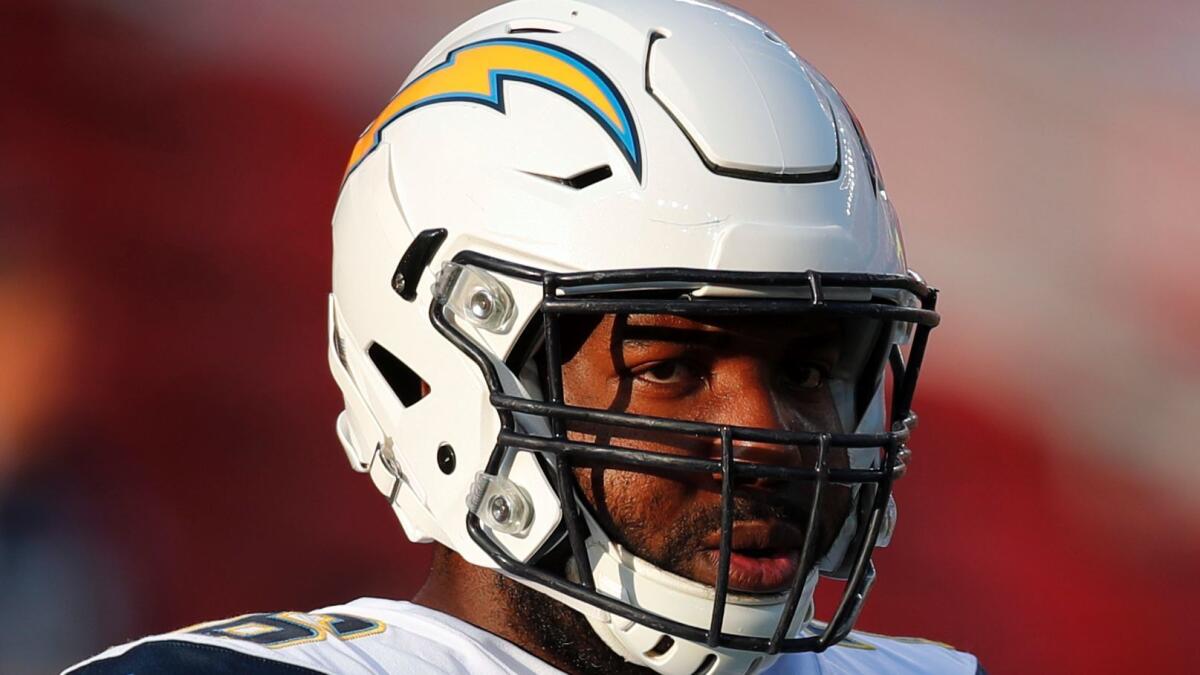
Russell Okung was a self-proclaimed “computer geek,” always tinkering with the machines and learning how to write code as a youngster.
“I was definitely into it,” the Chargers’ left tackle recalled before a practice this week in preparation for Sunday’s road game against the Oakland Raiders. “In my other life, I was supposed to be a computer engineer. Then football happened.”
Yeah, football generally happens when you grow up in Texas, you’re 6-foot-5 and 250 pounds by your senior year of high school and can toss aside prep defensive ends as if they were tackling dummies.
The sport has enriched Okung, who became an All-American at Oklahoma State, a first-round pick and Super Bowl champion with the Seattle Seahawks. He is in his eighth year in the NFL and first with the Chargers after signing a four-year, $53-million deal in March.
That doesn’t mean Okung, now 6-5 and 310 pounds, abandoned his early love. Technology is at the core of his numerous investments and off-field endeavors, and Okung hopes it provides a foundation for his ultimate goal: to become the first black owner of an NFL franchise.
“I’m dead serious about it — I’m a very serious guy,” Okung, 30, said. “We have a large percentage of players who are African American, and from an executive level, it’s important for people to be in ownership, to be general managers, to have jobs in the front office.
“That’s a problem across multiple leagues. The people who are making the decisions aren’t necessarily looking like the people who are playing. I think our ownership group needs diversity in thought and diversity in how they approach people. Right now, it’s lacking, and what’s going on in the NFL is evidence of that.”
Okung was alluding to the controversy over NFL players kneeling for the national anthem. The intent of those protests — to draw attention to racism and social injustice — has been lost by many amid claims by President Trump that players are disrespecting the country, the flag and soldiers.
As one of two Chargers player representatives, Okung has been heavily involved in discussions with the NFL, the players’ union, team management and teammates about how to proceed.
After six Chargers knelt during the anthem before a Sept. 24 game against Kansas City, players agreed to stand for the anthem before the last two games.
Okung wrote an “open letter to all NFL players,” posted on the Players’ Tribune website Friday, urging them to remain unified in their efforts.
“We’re staying focused,” Okung said. “I think a lot of it is a distraction to talk about the flag and the anthem, but we’re all about the issues, we’re all about equality and finding objective ways on how to get there.”
Okung is doing his part.
He co-founded the Greater Foundation, which works with STEM (science, technology, engineering and mathematics) schools to expose students in under-served areas to technology and provide computer education and job-training skills to adults.
Okung sits on the advisory board for One Team Collective, an NFL Players Assn. venture that provides sports tech startups with access to the intellectual property and licensing rights of more than 2,000 current and former NFL players in exchange for equity in their companies.
He’s a major investor in two startups — Loftium, which helps young homebuyers with down payments on the condition they rent out a portion of their home on Airbnb and share some of the profits with the company, and Rep the Squad, a company that rents NFL jerseys to fans for a monthly fee.
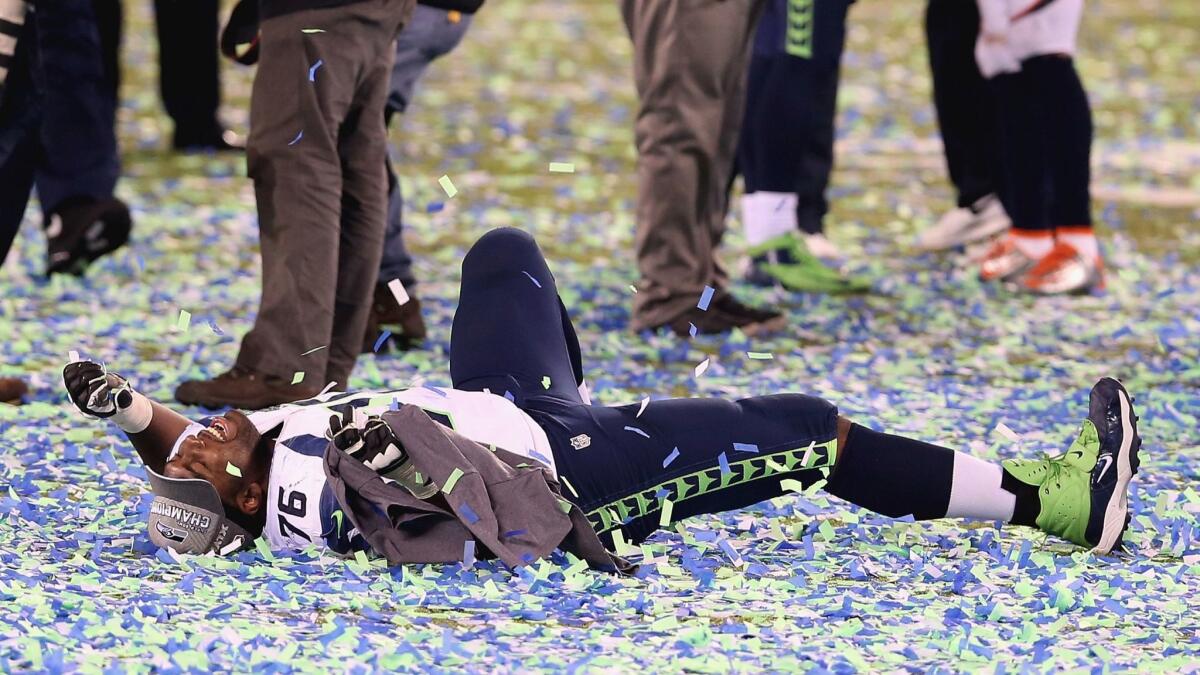
Okung said he knew virtually nothing about the tech field before being exposed to it in Seattle, where he played from 2010-15 and anchored a line that helped the Seahawks to back-to-back Super Bowl appearances in 2013 and 2014.
Now, he’s knee-deep in it.
“There are amazing opportunities to look at diversity in the tech sector in terms of how people are building products and how they look at certain services for a growing demographic,” Okung said. “We want to build a new sort of global citizen who can meet the qualifications of [tech] jobs and set a trajectory for their lives.”
Okung’s outside pursuits don’t interfere with his day job. While the Chargers (1-4) have had difficulty establishing the run, they rank sixth in passing offense, averaging 266.8 yards a game, and have allowed only six sacks, the third-fewest in the league.
Okung entered 2017 having allowed 24 sacks, fourth-fewest among left tackles who made at least 70 starts in that span. As the blind-side protector of quarterback Philip Rivers, Okung, who has played all 324 snaps in five games, has allowed one sack, in the opener at Denver.
“None of that [outside stuff] affects him on the field,” left guard Matt Slauson said. “He knows what’s important as a player, and this is getting 100% of his efforts. He’s smart, he’s got great drive, and he really wants to be the best.
“But he’s such a bright, intelligent guy, and relating to him is really easy. He’s well-versed in a lot of areas of life, and it’s fun to get his perspective on things, because there’s so many things going on right now in society.”
Another area of expertise for Okung, one that should help in his pursuit of an NFL management position, is contract negotiations. Unhappy with his representation earlier in his career, Okung began acting as his own agent.
The strategy seemed to backfire before 2016 when Okung signed what amounted to a one-year, $8 million contract with the Denver Broncos.
A year later, Okung negotiated a deal with the Chargers that guarantees him two years and $25 million, the fourth-highest guaranteed amount among NFL left tackles. He also saved at least $750,000 in agent’s commissions.
“I get a chance to be one of the highest-paid tackles in the game,” Okung said. “I took it upon myself to understand the business of football, and it worked out.”
Okung, raised in the Houston area by a single mother who stressed education, earned a business degree at Oklahoma State. He didn’t go to graduate school but has immersed himself in business and technology with the fervor of an MBA student.
He hopes there are dividends for both himself and the community in which he is trying to effect meaningful change.
“This is life,” Okung said. “We’re given a platform. We don’t know how long that it actually lasts, so I just want to be a good steward of what I have.”
Follow Mike DiGiovanna on Twitter @MikeDiGiovanna
More to Read
Go beyond the scoreboard
Get the latest on L.A.'s teams in the daily Sports Report newsletter.
You may occasionally receive promotional content from the Los Angeles Times.

